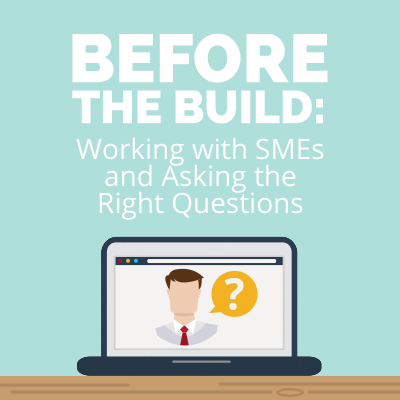How To Work With Subject Matter Experts
Uhh, the usual problem: How to work effectively with your Subject Matter Expert, your ultimate frenemy, throughout the eLearning development process? More often than not it seems you are coming from different planets; you both want your eLearning project to be perfect, and yet it seems you always follow completely different approaches towards the same goal. But here is the thing: The relationship between you and your Subject Matter Expert will determine whether your eLearning deliverable will be a success or a failure. In this article, I'll share a few things that might help you build a strong, trustworthy, and productive relationship with your Subject Matter Experts, whether they are engineers, college professors, salesmen, policy makers, doctors, etc., so that you can ensure that your are equipped with the right skills and mentality for working together successfully and making every single process run faster and smoother than even before.
5 Challenges Of Working With Subject Matter Experts
So, what could be problematic about working with someone who has great knowledge and experience and is there to help you create an effective eLearning experience? Here are the most common challenges that eLearning professionals and Instructional Designers face when working with Subject Matter Experts:
- They are not part of your project team.
As they all have full-time jobs, they usually don’t have a lot of time to spare and are difficult to find. Moreover, because they don’t work closely with your eLearning team, they are not always committed to the success of the eLearning course and they can get a bit territorial about their stuff. - They know it all.
Their vast knowledge and many years of experience make it difficult for them to accept that maybe, just maybe, not all content is equally important. - They resist change.
Because Subject Matter Experts have invested time in existing presentation material, they are usually unwilling to change things like colors, clip art, and fonts, which took them hours to select. - They are very fond of linear approaches.
Which makes it difficult for you to try new things and follow more interactive ways to engage your learners. - They don’t like bells and whistles.
Neither do you, but sometimes bells and whistles are necessary to grab your audience’s interest, and motivate them to learn. Mind you, “bells and whistles” might even include interactive branching scenarios.Design the Best Learning Experience for your Learners with the Most Engaging Branching Scenarios!Discover, choose and compare the top eLearning Authoring Tools with Branching Scenarios Functionality!
The Number 1 Top Skill For Working Smoothly With Subject Matter Experts
What that might be? It’s easy: Active listening. Developing your active listening skills will help you in all areas in your life and not only working effectively with Subject Matter Experts, so pay attention to this incredible ability. No matter how “pompous” the Subject Matter Expert may appear in your first meeting, listen to them and ask questions. Ask them about any stories they may have about big challenges they faced throughout their career and how they overcame them, and have them share their successful moments. When the ice has broken, reflect on what they are telling you and ask them specific questions about their material: Why did they choose these particular images? What are the design elements in their presentations that they like the most? How do they feel about converting their case studies into engaging, fascinating, interactive eLearning experiences? Show interest in your Subject Matter Experts’ work and make sure that it is clear you respect where they are coming from. Let them be heard and it will be easier for you to analyze and handle their resistance.
9 Ways To Work Effectively With Subject Matter Experts
Check the following easy ways that will facilitate the development process of your eLearning course material when working with your Subject Matter Experts:
- Make a good start.
A good start is half the battle, so make clear from the beginning that while you appreciate your Subject Matter Experts’ contribution, your roles are equally important; they provide the material, and you craft it in order to create effective and meaningful eLearning experiences together. When starting off a project, take the time to discuss with the Subject Matter Expert how you both relate to the project and what are your learning objectives. Do not take anything for granted; stating these things from the beginning will help build familiarity and a more clear picture of the team as a whole. - Do your homework.
Needless to say, while you are not expected to know everything about the subject matter, knowing a few things will make a world of difference. Take the time to do a little research, such as looking up terminology and jargon that is not familiar to you, before you meet with a Subject Matter Expert for the first time; they will greatly appreciate it. Furthermore, this initial research will help you create your eLearning course’s glossary; if you are not familiar with all the terms and acronyms, it is also likely that neither will be your learners. - Keep things clear.
To facilitate the process and make sure that your Subject Matter Experts are on the same page with everyone on the team throughout the development experience, consider doing the following things:- Establish expectations.
- Write a schedule with dates for online content reviews.
- Decide upon deadlines.
- Find ways to track progress.
- Have your questions ready before every meeting and make sure they are answered.
- Make notes and record your conversations, with your Subject Matter Expert’s permission of course, to avoid misunderstandings.
- Create a signoff document that ensures their approval of your eLearning course content.
- Get them involved.
The sad truth is, your eLearning project is not your Subject Matter Experts’ top priority. This is why you need to find ways to engage them by getting them interested, so that you will be able to easily find them when you need them. While identifying your goals in the beginning, ask them to answer questions such as why they think this eLearning course needs to exist, how it will improve learners’ lives or employees’ professional lives, and which is the best way in their opinion to measure the success of the program. This will not only help clarify the learning objectives, but also get your expert more involved in your eLearning project. Finally, during the process, ask them to help you find online activities that offer learners the opportunity to apply the knowledge they acquire. - Be flexible.
You are probably very busy, but your Subject Matter Expert is most likely to be even busier than you. Because the information they provide is critical for the success of your eLearning course, try and work around their schedule. If you are not able to find them, track down their assistant; if it is impossible to meet with them in person when you absolutely need to, invite them to a Skype chat. Last but not least, make sure that you are easy to find when your expert is looking for you. - Avoid existing Power Points.
Taking a distance from existing content will help you start from scratch, as pre-existing content may dictate how to design your eLearning course. Instead of using existing Power Points during your meetings with your Subject Matter Expert, begin from a blank screen in a starter template. This way your expert will become more flexible and innovation will be promoted. - Show them examples of good eLearning.
It is difficult to persuade anyone of anything without providing specific examples; you know that from your learners. Your Subject Matter Experts only know what they have experienced, so be prepared to show them examples of good eLearning courses that are similar to the one you want to create. Also, make sure that you explain how your learners will get all the information through a non-linear approach. - Send them feedback.
Show your Subject Matter Experts that you appreciate their work. Contact them frequently not only to get them in synch with your eLearning project, but also to acknowledge their work and time. Feedback will help maintain a positive atmosphere and also motivate them to get them more actively involved in the eLearning project. And don’t forget to send them a thank you email when your work with them is done. - Make it easy for them.
The biggest problem you will probably face while working with Subject Matter Experts is to persuade them to chop information they cherish in order to create an effective eLearning course. First, realize that it is very difficult for someone who has spent hours creating material to just throw it away. Then, make sure you find ways to turn this situation into a less painful one. What about creating in your eLearning course an “additional information” space with the chopped material?
Now that you know how to work effectively with Subject Matter Experts, you may be interested in learning whether the roles of Subject Matter Experts and Instructional Designers should be autonomous, identical, or interconnected. Read the article Is It Necessary For An Instructional Designer To Be A Subject Matter Expert? and find all the possible answers to this very interesting question.








